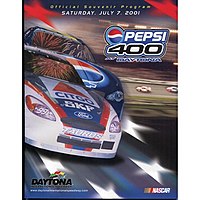
The 2004 NASCAR Nextel Cup Series was the 56th season of professional stock car racing in the United States and the 33rd modern-era Cup series season. The season began on Saturday, February 7, and ended on Sunday, November 21. Kurt Busch, who drove a Ford for Roush Racing, was the Nextel Cup champion. It would be the last time until 2012 that the championship would be won by someone other than Tony Stewart or Jimmie Johnson.

The 2003 NASCAR Winston Cup Series was the 55th season of professional stock car racing in the United States and the 32nd modern-era Cup Series season. The season began on February 8 at the Daytona International Speedway with the Budweiser Shootout and ended on November 16 at Homestead-Miami Speedway with the Ford 400. Despite only winning one race throughout the whole season, Matt Kenseth, driving the No.17 Ford for Roush Racing, was strongly consistent following the lone win, and was crowned the Winston Cup champion. His only win came in the third race of the 36 race season. Chevrolet took home the NASCAR Manufacturers' Championship after capturing 19 wins and 264 points over second-place finisher Dodge, who had nine wins and 203 points. Ford finished the year third with seven wins and 200 points, and Pontiac finished fourth with one win and 125 points.
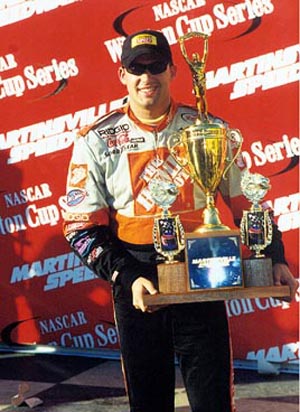
The 2002 NASCAR Winston Cup Series was the 54th season of professional stock car racing in the United States and the 31st modern-era Cup Series season. It began on February 10, 2002, at Daytona International Speedway, and ended on November 17, 2002, at Homestead-Miami Speedway. Tony Stewart, driving for Joe Gibbs Racing, was declared as the Winston Cup champion. Bill Elliott won the 2002 NASCAR's Most Popular Driver Award. He would win it for the 16th and final time in his career. He withdrew from the ballot after receiving the award. The NASCAR Manufacturers' Championship was captured by Ford after winning 14 events and gaining 245 points over second-place finisher Chevrolet, who had 10 wins and 211 points.

The 1998 NASCAR Winston Cup Series was the 50th season of professional stock car racing in the United States and the 27th modern-era cup series. The season included 33 races and three exhibition races, beginning with the Daytona 500 at Daytona International Speedway and ending with the NAPA 500 at Atlanta Motor Speedway. Jeff Gordon won the Driver's Championship, the third of his career, and his third in the last four seasons.

The 1999 NASCAR Winston Cup Series was the 51st season of professional Stock car racing in the United States, the 28th modern-era Cup series, and the last Cup season of the 1990s and the 20th century. The season began on Sunday, February 7, and ended on Sunday, November 21. Dale Jarrett, representing Robert Yates Racing, was crowned the champion, while the NASCAR Manufacturers' Championship was won by the Ford drivers with 13 wins and 231 points over second-place Chevrolet who had 12 wins and 210 points and third place Pontiac who had 9 wins and 205 points.

The 2000 NASCAR Winston Cup Series was the 52nd season of professional stock car racing in the United States, and was the 29th modern-era Cup series. The season began on February 13 and ended on November 20. Joe Gibbs Racing driver Bobby Labonte was crowned champion at season's end. The NASCAR Manufacturers' Championship was won by Ford as they captured 14 wins and 234 points to better Pontiac's 11 wins and 213 points. Chevrolet finished third with nine wins and 199 points.

The 1997 NASCAR Winston Cup Series was the 49th season of professional stock car racing in the United States and the 26th modern-era NASCAR Cup series. It began on February 9 and ended on November 16. Jeff Gordon of Hendrick Motorsports won his second Cup championship at the end of the season.
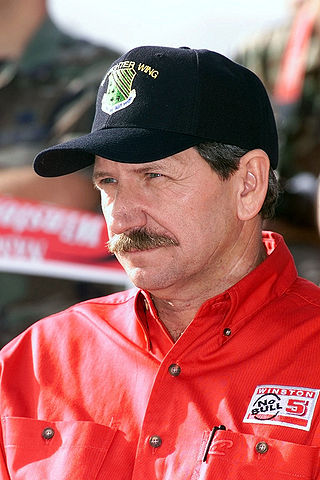
The 1994 NASCAR Winston Cup Series was the 46th season of NASCAR professional stock car racing in the United States and the 23rd modern-era Cup series. The season began on Sunday, February 20, and ended on Sunday, November 13. Dale Earnhardt of Richard Childress Racing was crowned champion at season's end, winning consecutive Winston Cups for the third time in his career and tying Richard Petty for the record of most top-level NASCAR championships with seven. It was also the 7th and final NASCAR Winston Cup Series Championship for Dale Earnhardt before his death 7 years later in 2001, this was also the final season for 18-time Winston Cup winner Harry Gant.
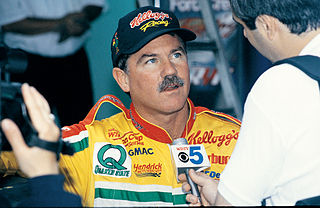
The 1996 NASCAR Winston Cup Series was the 48th season of professional stock car racing in the United States and the 25th modern-era NASCAR Cup series. The season had been started on February 18 at Daytona International Speedway, and ended on November 10 at Atlanta Motor Speedway. The season would be remembered for Terry Labonte pulling off a massive upset and winning his second Winston Cup Championship over teammate Jeff Gordon.
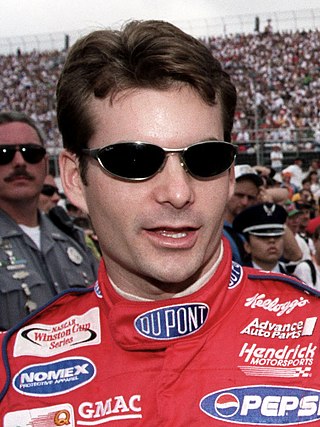
The 2001 NASCAR Winston Cup Series was the 53rd season of professional stock car racing in the United States, the 30th modern-era Cup series. It began on February 11, 2001, at Daytona International Speedway and ended on November 23, 2001, at New Hampshire International Speedway. Jeff Gordon of Hendrick Motorsports was declared as the series champion for the fourth time in seven years.

The 1995 NASCAR Winston Cup Series was the 47th season of professional stock car racing in the United States and the 24th modern-era Cup series season. The season began on February 12 in Daytona Beach and concluded on November 12 at the Atlanta Motor Speedway. Jeff Gordon of Hendrick Motorsports won his first career championship.

The 1991 NASCAR Winston Cup Series was the 43rd of professional stock car racing in the United States and the 20th modern-era Cup Season. It began February 10 and ended November 17. Dale Earnhardt of Richard Childress Racing won his fifth Winston Cup championship at the conclusion of the season. The season was marred by the death of driver and team owner J. D. McDuffie, who was killed in a wreck at Watkins Glen.
The 1989 NASCAR Winston Cup Series was the 41st season of professional stock car racing in the United States and the 18th modern-era Cup season. It began February 12 and ended November 19. Rusty Wallace of Blue Max Racing won the championship. This was the first year that every Winston Cup race had flag to flag coverage, with almost all of them being televised live.

The 2001 Daytona 500, the 43rd running of the event, was the first race of the 2001 NASCAR Winston Cup Series schedule. It was held on February 18, 2001, at Daytona International Speedway in Daytona Beach, Florida, consisting of 200 laps and 500 miles on the 2.5-mile (4 km) asphalt tri-oval.
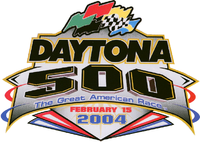
The 2004 Daytona 500, the 46th running of the event, was the first race of the 2004 NASCAR Nextel Cup season. It was a race held on February 15, 2004, at Daytona International Speedway in Daytona Beach, Florida. The race was televised by NBC, with Allen Bestwick, 1975 race winner Benny Parsons, and Wally Dallenbach Jr. calling the action for the second time after the 2002 race. It was the first NASCAR Nextel Cup race to air in high definition.

The Coke Zero Sugar 400 is an annual NASCAR Cup Series stock car race at Daytona International Speedway. First held in 1959, the event consists of 160 laps, 400-mile (640 km), and is the second of two major stock car events held at Daytona on the Cup Series circuit, the other being the Daytona 500. From its inception in 1959 through 2019, it was traditionally held on or around the United States' Independence Day. In 1998, it became the first stock car race at Daytona to be held at night under-the-lights. In 2020, the race was moved to late August.
The 2002 edition of The Winston was held on May 18, 2002 at Lowe's Motor Speedway in Concord, North Carolina. It featured the last multiple-segment Open where only segment winners advanced until 2015, and had a 27-car field, the largest in All-Star race history. Ryan Newman won the race and became the second driver since Michael Waltrip to win the event after coming out from the Open and the only driver from the second segment to win. Newman and Jeremy Mayfield advance to The Winston after winning the two segments of the Open races.
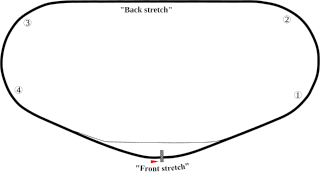
The 2004 Pepsi 400 was the 17th race of the 2004 NASCAR Nextel Cup Series season. It was held on July 3, 2004 at Daytona International Speedway in Daytona Beach, Florida. Jeff Gordon of Hendrick Motorsports won the race from the pole position and also led the most laps.
The 1996 edition of The Winston Select was a stock car racing competition that took place on May 18, 1996. Held at Charlotte Motor Speedway in Concord, North Carolina, the 70-lap race was an exhibition race in the 1996 NASCAR Winston Cup Series. Jeff Gordon of Hendrick Motorsports won the pole. Terry Labonte of Hendrick Motorsports led the most laps with 22 of the 70 laps. Michael Waltrip of Wood Brothers Racing became the first transferee to win the Winston Select after qualifying in the Winston Select Open.

The 2002 Pepsi 400 was the 17th stock car race of the 2002 NASCAR Winston Cup Series and the 44th iteration of the event. The race was held on Saturday, July 6, 2002, in Daytona Beach, Florida at Daytona International Speedway, a 2.5 miles (4.0 km) permanent triangular-shaped superspeedway. The race took the scheduled 160 laps to complete. At race's end, Michael Waltrip, driving for Dale Earnhardt, Inc., would win a crash-marred race under caution, a decision that would prove controversial with fans, as they wanted the race to finish under green. To fill out the podium, Rusty Wallace of Penske Racing and Sterling Marlin of Chip Ganassi Racing would finish second and third, respectively.
